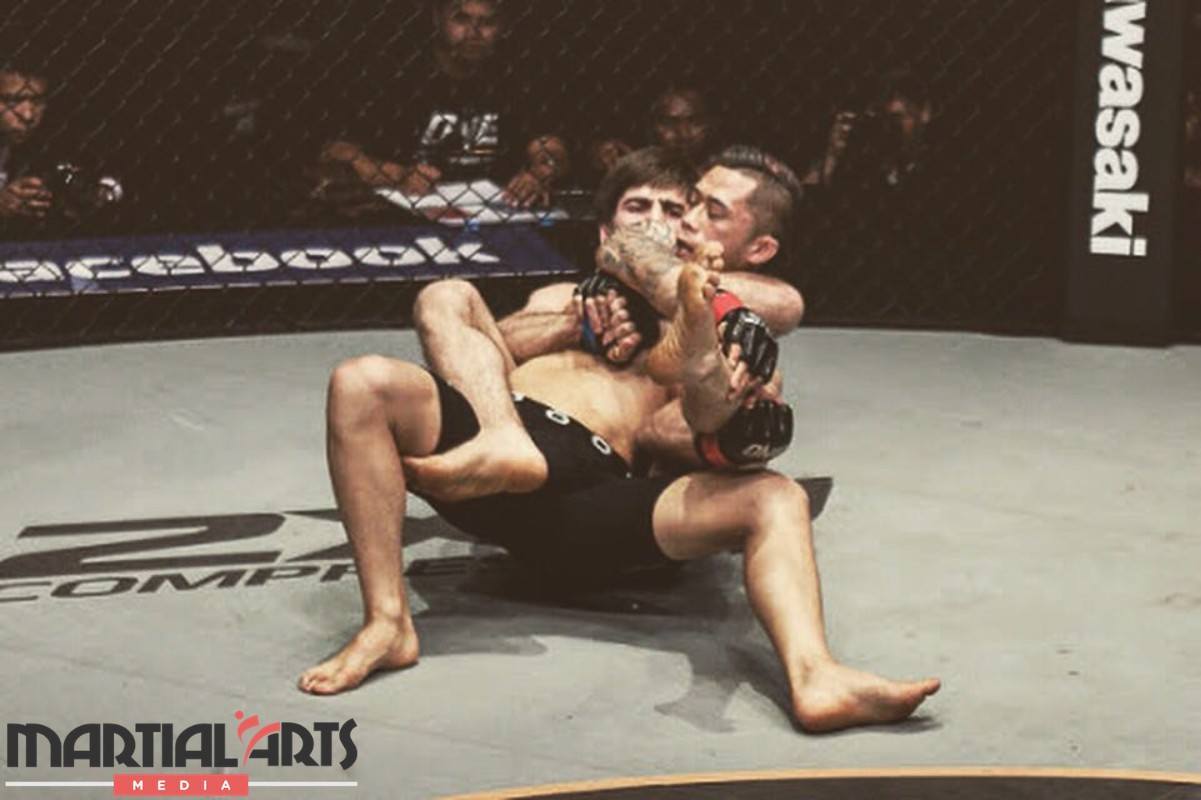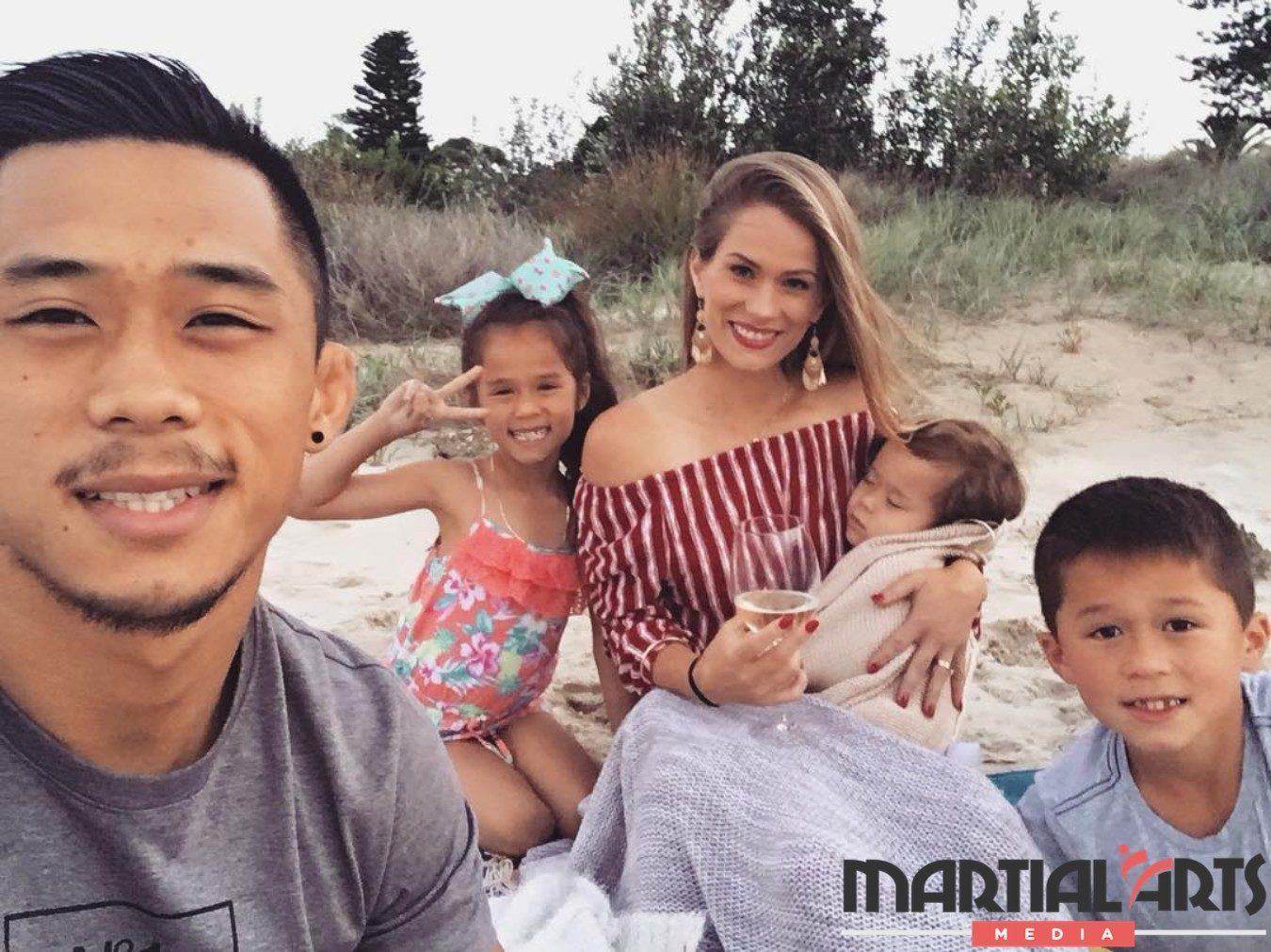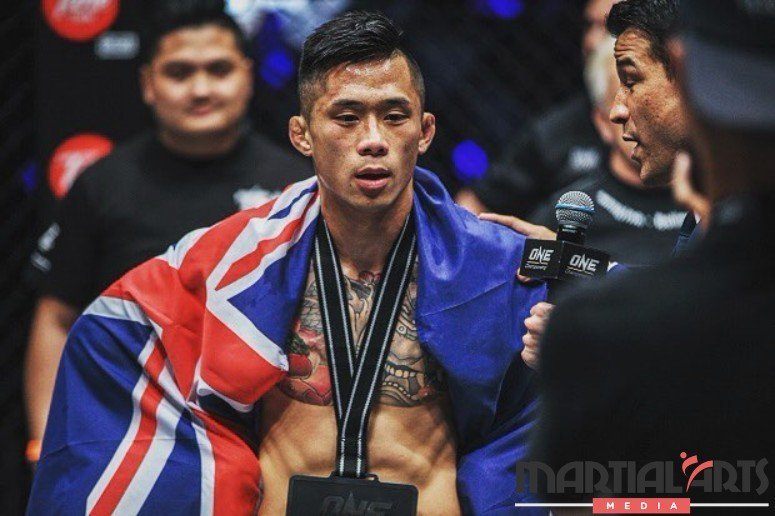Martin “The Situ-Asian” Nguyen, ONE Championship's two-division title holder has big goals, and it's all in the name of family.

IN THIS EPISODE, YOU WILL LEARN:
- What it takes to be a two-division title holder with ONE Championship
- Master Fari Salievski’s massive contribution to Martin Nguyen’s MMA career
- How Martin’s Rugby League career evolved into his Martial Arts Journey
- Martin’s source of inspiration
- How he is able to balance his family, work and martial arts life
- And more
*Need help growing your martial arts school? Learn More Here.
TRANSCRIPTION
This MMA career is about family for me, so you’ve already addressed that family situation, so I mean, it’s more than I could ever ask for at the end of the day.
GEORGE: Hi, this is George Fourie and welcome to another Martial Arts Media business podcast. In this episode though, we are going to venture off from the business side of things. And I’ve got a really special guest with me today, who’s created a bit of a stir in the MMA world and has just recently become a two-division title holder with ONE Championship. So I want to welcome to the show Martin Nguyen.
MARTIN: Hey man, thanks for having me on the show.
GEORGE: Awesome. Cool, so Martin, Martin’s name might first be familiar, I know I’ve spoken to Master Fari Salievski a few times on the podcast and the last time, it was after your first title fight.
MARTIN: Malaysia, against Marat Gafurov.

GEORGE: That was the one, the featherweight one. And we had a bit of a chat just about your training and the process from there. But then you went on to… moved up to lightweight as well and you took the title there as well. So first, I guess I want to say congratulations!
MARTIN: Thank you, thank you. It wasn’t a plan to move up to the lightweight division, Eduard Folayang, the former title holder is a friend of mine and the plan was never to move up, but it actually played well in my favor after some agreements, but yeah.
GEORGE: We’re going to get into all the details of that, but I guess we should just take a few steps back. I mean, before all these events started happening in your life, who is Martin really?
MARTIN: Oh, I’m just a regular guy. I work full time, I’m a father of three, married, husband… yeah, just a normal regular guy, that just loves mixed martial arts, loves training, loves the competitiveness and just love the disciplinary actions that come with it.
GEORGE: Ok, so now, I’ve just been reading a couple of things about you, just to get an idea of your background. So you got started in martial arts fairly late I guess?
MARTIN: Yeah, I started mixed martial arts when I was 21, so at that stage, that was when UFC was starting to boom, I was coming off an injury from the rugby league and I was a bit overweight you know, and lost a bit of confidence. So a friend of mine introduced me to Master Fari and KMA school gym and I started with Brazilian jiu-jitsu, just the grappling side of it. I loved it and was stuck from day one and we kept going from there.

GEORGE: So 21, and you’re now 28?
MARTIN: Yeah, I’m 28. I’ve been in the martial arts game for about 7 years now.
GEORGE: At what point did you… so, you came from rugby – did you quit rugby completely and then just moved over to martial arts?
MARTIN: No, no, when I was 16, I was playing rugby league, Harold Matthews cup and just caught a few injuries through Harold Matthews and just played rugby league up until I was about 18 years old. Come to the end of C grade, I called it quits, just too many injuries, recurring. So 19, 19 to 21… actually, when I was 19, I took time off everything, and 20 to 21, I started lifting weights and I got a bit big, more fatty-stocky, but yeah. And then from there, that's when my friend introduced me and we went from there.
GEORGE: Alright, cool. So you start this martial arts journey and at what point did you feel it’s time to sort of step it up?
MARTIN: Ok, so, what happened was, I started Brazilian Jiu-Jitsu as I said, and during my first year and a half, I went on a few comps, some New South Wales Jiu-Jitsu comps. I ranked third, fourth and from there, I liked the competitiveness of Brazilian Jiu-Jitsu, so we kept going into comps, ISKA comps, and I won a few matches through ISKA. And then, at that time, there were a few MMA fighters that were busting out on the local scene.
And watching them train and seeing what they go through was kind of an inspiration for me to want to try and keep up with them, so Master Fari just set the path for me, gradually going into MMA, so we started off with kickboxing, and he got a few Thai guys in, we’ve done Thai kickboxing, I still kept up with my Jiu Jitsu and then I started training up for an ISKA amateur MMA comp and I took out the competition twice, two years in a row. And from there, when I was roughly about 23 to 24, we decided to step into the cage from there.
GEORGE: Exciting stuff! How did it all lead up to your first title with ONE Championship?
MARTIN: During the local scene, I racked up a few wins and I fought for the national Australian title, featherweight title. And I was facing a guy that was busting on the local scene as well. I beat him and the winner of that fight got a contract into ONE Championship, which… I wouldn’t say just started up, but they started up and were looking for new fighters, where KMA had become partners with ONE Championship. So the winner of that title fight got the contract and that was my opening on the world stage.
So I won my first fight with ONE Championship and for my second fight, I was meant to be fighting another up and comer, hot prospect, but that fight got cancelled 48 hours before the event was about to be held. And I got moved from the first fight of the night to the main event, fighting for an interim world title against ONE of the hot prospects around the world and I lost that fight in the first round. And that motivated me to train and just… everything just stepped up another notch of where I had to be and where I was. So from there, I won four in a row, which eventually led to my rematch with the title holder.
GEORGE: That's going to take some dedication on your behalf, you know? You mentioned you’re married, you’ve got three kids, you’re still working a day job – so how do you fit this all in, and obviously, you know, you’ve set some big goals for where it is that you are headed, which well get to in a bit in this conversation. But just walk us through – how do you manage your training commitment and everything, to be fighting at this level with everything else going on in your life?
MARTIN: Yeah, so it’s definitely hard. No one could say it’s easy, and the main person that helps me out the most is my wife. She steps up as the parent to take on both roles, both father and mother when I’m not here, to look after the kids. I wake up at 6 o’clock in the morning, I leave the house, I get my morning training in, I go straight to work.

Finish work, I go straight to KMA to do my second session of the day. And I come home and my wife’s there, looking after the kids. She plays a big role when it comes to this MMA career and she’s my nutritionist as well as my wife as well as, you know? She’s looking after a fourth child basically. So to be honest, I wouldn't be able to do much of what I’m doing now without her, so yeah, the support that she’s shown me, I’m forever grateful.
GEORGE: Yeah, the saying goes true that behind every successful man there’s a successful woman.
MARTIN: Oh, a 100%, a 100%, I believe in that.
GEORGE: So Martin, I want to just go a bit into your background. You were born and raised in Sydney, and it’s mentioned that you come from refugee parents, so you’re from Vietnam I believe? How's that been different for you, sort of growing up in Australia? Has it been different for you, because you’re a 100% first born Australian, kind of like my son is in a way? But growing up in a sort of different environment from parents, from a different point of view, and I guess a better appreciation for what you have in Australia – how's that affected you in growing up and moving forward?
MARTIN: Look, growing up, we weren't… yes, we did come from a refugee background, I was born in Australia, so were all my other siblings. Me, my brother, my older sister and younger sister. But growing up in Australia – look, we grew up the OZ way. We are OZ kids, my parents never brought any politics or anything that they went through in our lives, so we grew up living the OZ dream. I’m so thankful for this country because it’s one of the best countries in the world to live in. Everything that happened though school, throughout life in general, my parents they raised us all up as an OZ child, you know? So there was no racism or anything going on, no bullying. We were pretty lucky and fortunate at that stage there.
GEORGE: And have you ever returned back to Vietnam? I mean you’ve been back obviously, but in a way to sort of explore what life would have been for you in a way?
MARTIN: No, it hasn't played in the back of my mind at all, to be honest. Living in Australia and there, you can’t compare. Yes, I’ve been back to Vietnam, just after high school, and I’ve seen the way my father's family live over there and you know what? What we have over here, sometimes people take for granted. But you know what, the way my parents raised us, we never take anything for granted, I’m so thankful for everything that happens in our lives, you know?
GEORGE: That's such a good point and the reason I ask this question, because, I’ve immigrated from South Africa probably about eleven years ago. And growing up in a country that's… it’s still known as first world, third world politics probably, but seeing how tough life really is, I see people complain about thing that in perspective, it’s really nothing. It’s fabricated problems, where I’m used to going… if I go back home, I’m used to seeing, there are people with real hunger, there are people on the street that are actually really struggling. How do I feed my family tonight, type of problems? Which is, I think, something people take for granted, living in.
MARTIN: It is, it is. I mean, it’s not only our country but everywhere around the world it happens, I think it’s just our natural ability, just to complain.
GEORGE: Yeah. So, Martin, you won the featherweight Championship and then, as you’ve mentioned earlier, you saw the opportunity came up. Then you managed to become a two-division title holder. So, what kind of doors does that open for you, from here on?
MARTIN: Yeah, being a two-time division champion, there’s only a handful of us in the world that's actually ever become two divisional title holders. So where it is from here, well, we’ve already set our goals from before we even fought for the featherweight title. You know, we always said, Master Fari and I sat down and we had a chat, we always have our little chats when we go on our little trips here and there and training sessions. We said we’re going to win this belt. The plan was to go down the weight division because I knew how to make the weight and fight that title holder for his belt.

ONE Championship had other plans and that put me up against the lightweight title holder, which worked out in our favour of going up the vision and winning that title, but where it is going from now: the fight is booked. It’s booked for March, fighting for the third world title and basically becoming one of the first fighters ever in the world to hold three titles consistently in three different divisions.
GEORGE: That's a big goal, that's fantastic.
MARTIN: It’s a massive goal, it’s a massive fight, but I feel like this is my time and when your body feels right and everything feels right and the stars align, it’s bound to happen.
GEORGE: Yes, you’re right about that. And I mean, you’ve proven that it’s possible, so I can’t see that there should be any doubt in your mind that it’s an unachievable goal. So let’s say you get to a third world title: where do you see yourself taking your MMA career?
MARTIN: If I do win this third world title, then I look to defending the title, so basically everyone wants what you have. And I’ve worked so hard for me to get to this position where I am in life at the moment, so I’ll be defending all three titles, consistently, and you know what? We’ll play it by ear, whatever ONE Championship wants to do, I’ll go with it and we’ll start building a career from there.
GEORGE: Any plans to venture away from ONE Championship, or do you feel you’ve found your home and you’re going to continue with where you are at?
MARTIN: Yeah, everyone's been asking me this question, when am I going to go into UFC, or you know, when are you going to venture out of ONE Championship and move on, you know? But you know what, I’m happy where I am at the moment, and I always go by the saying, if something's not broken, why change it? So the way ONE Championship are treating us, are treating me in particular as a professional, mixed martial artist, I’m happy the way it is and it’s setting up a platform not only for me but for my family as well.
So in terms of going to the UFC – you never know at the end of the day. I’ll be defending my titles consistently, until… I guess it’s, you know when it’s time to move on and yeah, at that time, at the moment it’s not looking like that. I’m happy where I am and I think I’ll be staying with ONE Championship for a while, so in terms of moving on, it’s not going to happen anytime soon.
GEORGE: So Martin, thanks. Thanks for being on the show and look, I normally don’t speak to MMA fighters on the show, nor anybody of your caliber, so I want to ask you the question: is there anything that I haven’t asked you that I should have asked you?
MARTIN: To be honest, you’ve asked the majority of the main questions that every journalist has asked me, in terms of what other people would want to ask me… I mean, you’ve asked everything, everything in this MMA career is about family for me, so you’ve already addressed that family situation. So I mean, it’s more than I could ever ask for at the end of the day. Sorry, I’ve got my daughter, she’s jumping on me!

GEORGE: That's awesome. Cool, lastly Martin: firstly, I wish you all the best, what you’ve achieved is fantastic and I saw that video clip of you holding both belts and just pure emotion. Obviously, expressing thanks to your family, your dad as well and everything. It’s just fantastic to see, you look like a really genuine guy. You deserve all the success that's coming your way. So for anybody that wants to follow you and support you on this journey, where can people find details about you?
MARTIN: So, I’ve got three main accounts. My first one is obviously Facebook, where everyone's got it. I’ve got my personal fighters page, where it’s Martin “The Situ-Asian” Nguyen. Then I have my Instagram account, where it’s at, itsmartiinn. And I have my twitter account, which is MartinNguyenKMA.
GEORGE: Alright, fantastic.
MARTIN: Keep in contact with me, that's the main accounts that I’m usually on and I usually post a lot of stuff up, just to let the fans know what's happening in my career at that point in time.
GEORGE: Alright, fantastic. Martin, I wish you all the best and we’ll put links in the show notes to all your accounts so that anybody can follow you and all the best!
MARTIN: Done deal, thanks, George.
GEORGE: Thanks, Martin, speak soon – cheers.
*Need help growing your martial arts school? Learn More Here.
Enjoyed the show? Get more martial arts business tips when you subscribe on iTunes for iPhone or Stitcher Radio for Android devices.




